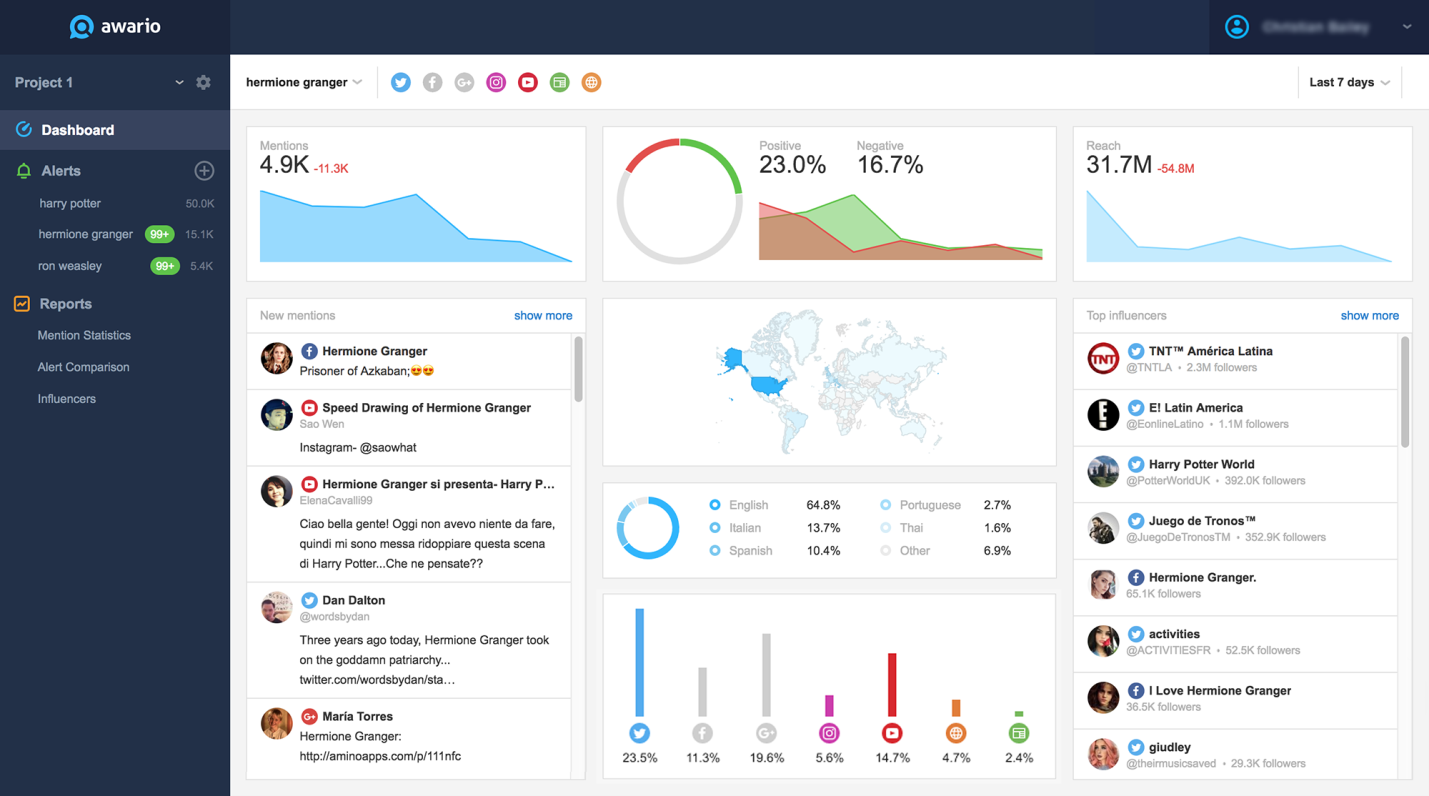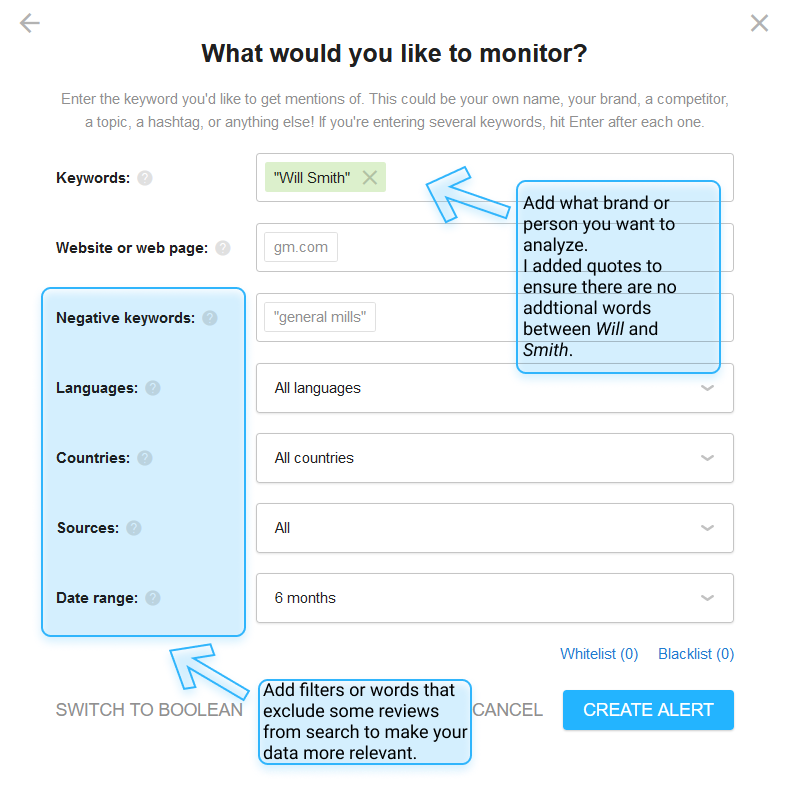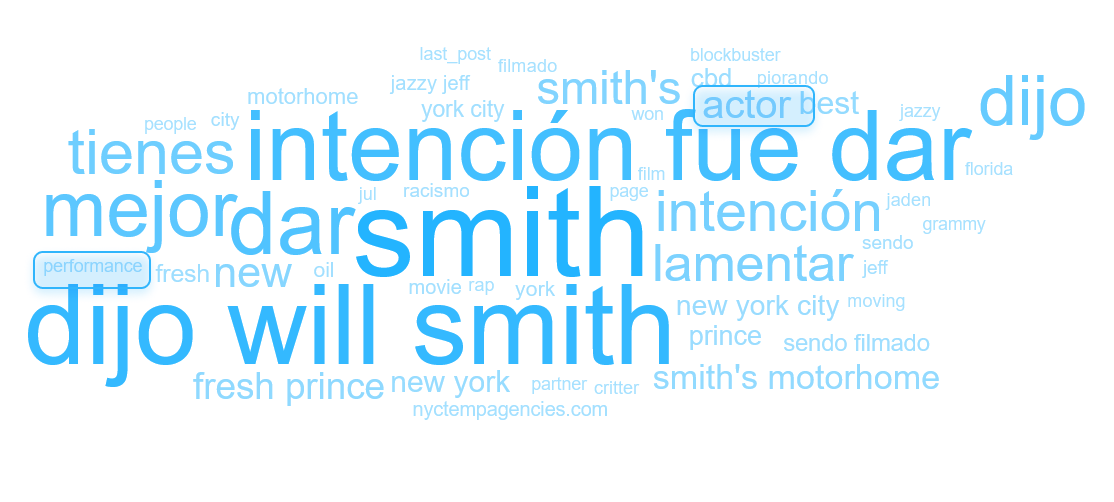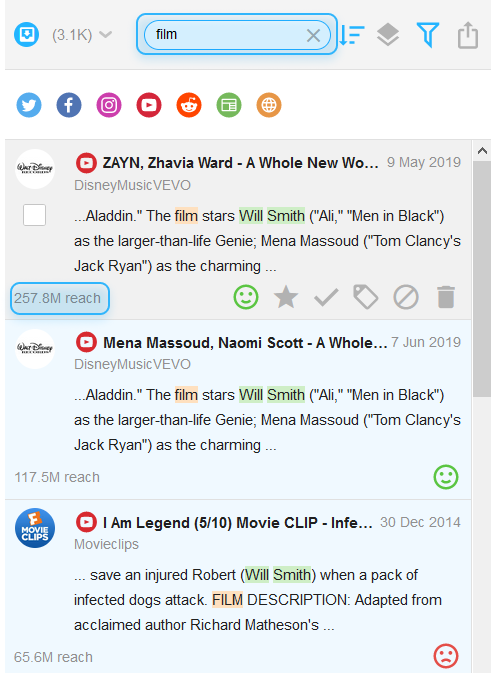Why everybody loves Will Smith: online reputation analysis

Article summary
In this blog post, we analyze Will Smith's online reputation to show you how to do it for your client or brand.
It's unlikely that this blog post will be read by a Hollywood actor.
But whether you're an influencer, public person, or marketing professional, you need to know how to analyze online reputation.
According to Reputation X, 97% of consumers search for businesses online, and 3 out of 4 consumers trust a company more if it has positive reviews. That's why online reputation management and analysis are essential if you want to run a profitable business, whether you're a freelancer or a brand owner.
In this blog post, we wanted to give you an example of reputation analysis by analyzing the reputation of Will Smith. But before we dive into all the tips and hacks to help you analyze reputation, let's figure out what exactly we are talking about when we say "reputation analysis".
What is reputation analysis?
To put it simply, it's the analysis of anything people say about you online: every review, blog post, or social media mention. Your goal is to know whether people like you (or your brand) or not and what exactly they like. Quite simple, right?
A good reputation analysis should answer the following questions:
- How many people talk about you i.e. your brand awareness level?
- What do they say about your brand?
- Who are the people talking about your brand i.e. audience analysis?
Once you answer these questions, you are ready to start amplifying the parts that people like and fixing your downfalls.
Pro tip
It's important to note that online reputation management should be an ongoing process. You can't just analyze your reputation once and be done with it — you need to monitor your reputation in order to keep the good word and avoid reputation crises.
Who and why should analyze the reputation?
As I mentioned above, reputation analysis is for everyone.
- If you're a freelancer, you need to monitor your reputation to make sure you get new clients.
- If you're a small business owner or an entrepreneur, you need to keep an eye on your reviews and online mentions in order to grow your business. Bad reputation can even affect your investment opportunities.
- If you're a marketing manager or a PR executive, your company's reputation is your primary concern — you can't lead any PR or marketing activities without taking care of it first.
Now that we know what online reputation analysis is, let's talk about the practicalities: how do you do it?
By signing up I agree to the Terms of Use and Privacy Policy
How to analyze your reputation?
Well, first of all, you'll need a reputation management tool. Of course, you could start your day by Googling your brand, checking every review site you know and looking up yourself on social media, but there is no guarantee you won't miss something.
A reputation management tool finds every mention of your brand online and sorts them and analyzes them so you can quickly understand whether it's a praise or a bad review, how many people it reached, and how to fix the problem if there's one.
Reputation management tools
There are two types of tools you can use for online reputation management and analysis: review analyzers and social media monitoring tools. Review analyzers monitor your mentions on major review platforms such as Yelp. Social listening tools find your mentions online whether they are posted on social media, blogs, news, or websites, and analyze them.
Here are some examples of reputation management tools:
1. Awario

Awario is a social listening tool that finds your mentions online. It's able to analyze the sentiment behind the mention, its reach, the popularity of your brand, and compare it to your competitors. It easily filters and sorts mentions, prioritizing those that can harm your reputation the most.
In addition to that, you can analyze your audience and interact with your mentions right from the tool.
You can try Awario's free trial and analyze your mentions. The pricing starts at $29.
2. Reputology

Reputology is a review monitoring platform. It's also able to analyze the sentiment behind the reviews on major review websites and lets you interact with those reviews. It is easy to use by teams and offers you to have an automated feedback collection to give quick answers to reviews.
The pricing starts at $25.
If you're more focused on online reviews on relevant platforms, you can try a reviewer analyzer. If you want to monitor social media and blog mentions as well as reviews, social listening tools are a good choice. There are plenty of tools on the market you can choose from.
Ok, now you have the right tool at your disposal, so the only thing left is to actually analyze your reputation!
I took Will Smith as a good example since he is extremely famous, has a consistent online presence and, like any public figure, is greatly dependent on his reputation.
For this analysis, I'll be using Awario, so if you haven't decided on the tool yet, grab Awario's free trial and follow along!
Online reputation analysis example: Will Smith
The first thing to do is set up a monitoring alert. Here you'll need to add keywords that you want to monitor: your name, your brand, or the name of a public person whose reputation you want to analyze (for example, your CEO).
You can also add different filters such as languages, countries, or choose the sources of the mention. Since I wanted to analyze Will Smith's reputation as broadly as possible, I didn't add any.
How popular is Will Smith?

First, we need to know how popular your person or brand is. To do that, we can look at the number of your followers online and check the number of mentions and their reach in Awario — you can find this information in the Dashboard.
According to Awario, in the last month, the actor was mentioned 52.5K times reaching more than 2 billion people!

In addition to that, his follower count on social media is also a good indicator of his online visibility: he amasses more than 167 million followers across YouTube, Facebook, and Instagram.
According to Google Trends, people google Will Smith around 40 times a week.
By signing up I agree to the Terms of Use and Privacy Policy
Marketing takeaway
You need to know your brand awareness level right from the start so you can understand what reviews and comments are more significant to you. If you are a brand with reach counted in billions, a tweet from an account with 10 followers won't be your immediate priority, so defining your popularity is the first step to reputation analysis.
To do that, you can check your social media profiles following count, use Awario and Google Trends to find how many people are interested in you, and discuss you online.
What is the prevailing tone behind conversations about Will Smith?
It's time to look at the sentiment analysis — you can also find this metric in Awario's Dashboard.
Will Smith is well-liked by his audience. According to Awario, 38.5% of his mentions are positive and only 12.8% are negative (the rest is neutral).

If you're managing the reputation of a brand or a person, you can then go to the Mention Feed of your alert and filter it to only see negative mentions and then sort the mentions by reach.

This way you'll be able to find complaints and negative reviews that are visible to a lot of people first and take care of them. Since Will Smith is so well-received, I won't be looking at individual negative mentions.
Marketing takeaway
Sentiment analysis helps you notice potential reputational crises. By taking care of negative reviews and comments, you ensure that your reputation is safe. One negative review, if it reaches enough people, can ruin your whole business.
That's why it's important to analyze the sentiment of your mentions, find negative posts, and engage with them.
An influx of negative posts can help you identify some faults with your product or marketing campaign. And vice versa — a large amount of positive comments can help you see what areas of your business need to be highlighted in your marketing.
What are the biggest themes and topics discussed in relation to Will Smith?
Now we need to check what exactly people are saying about you (or Will Smith). Do they like his latest film? Do they admire his adorable family? Do they love your brand for reliability and excellent customer service or dislike it because of annoying sales representatives?
To answer these question, we'll need to Awario's features: the Topic Cloud and the Mention Feed.
First, let's look at the Topic cloud. It gathers the most popular phrases associated with your brand or person based on how many times they were mentioned.

We can see that for Will Smith the biggest topics of conversation are his work (words like actor), his family (Jaden Smith) and... his thoughts. The Spanish phrase is actually a part of his quote about life that went viral on Twitter.
Como dijo Will Smith:
— ᴇsᴄʀɪᴛᴏs? (@gessicabanks) May 26, 2021
Si sabes que tu intención fue dar lo mejor, entonces no tienes nada que lamentar.
Once you checked out the Topic cloud, go the Mention Feed and take a look at individual reviews, blog entries, and social media posts. You can filter and sort them any way you want, or even look for a specific word or phrase that's featured in this mentions.
For example, here's a screenshot of Will Smith's mentions that talk about film sorted by reach.

Marketing takeaway
A deep dive in the context of your mentions helps you pinpoint what exactly needs to be addressed to improve your reputation. You can notice errors in your product development, marketing strategy, or customer service or identify your advantages to double down on them in the future.
Pro tip
Analyze the reputation of your competitors. Running reputation analysis for your competitors can help you identify common problems in your niche and maybe even find potential customers who are dissatisfied with your competitor.
Who are the people talking about Will Smith?
Now that we ensured that Will Smith's reputation is safe, let's see who exactly shapes his reputation: his audience.
Awario helps you run an audience analysis along with reputation analysis. Just go to the Mention Statistics report and see who is talking about your brand or person.
Understandably, most of Will Smith's audience lives in the US, with fewer people talking about him in Spain, Argentina, and Mexico.

The gender breakdown of his audience is pretty even, with a slightly bigger number of men talking about him.

He is popular with younger people, especially millennials. However, 8% of his audience is Gen Z, and for an older celebrity it's a big win. He manages to stay relevant even with the TikTok generation!

Expectedly, most accounts talking about him belong to people, not organizations. It's rare that companies discuss celebrities unless it's a media platform or a newspaper.

So, we can conclude that Will Smith has a young international audience, appeals to all genders, and is very popular.
Marketing takeaway
Audience analysis provides you with information on the people who build your reputation. By learning more about them you can realize how to improve your дreputation with a specific audience.
For example, if you find out that your audience is mostly tech-savvy millenials, you may want to focus on Twitter as your major communication channel.
That's it — all the information you need to check your online reputation. From there, you can start taking steps to improve it: reshare praise and take care of complaints. To learn how to manage your reputation, check out this article.
Remember as I mentioned before reputation analysis is an ongoing process. Monitoring your reputation regularly helps you notice a sudden spike of negative mentions and take care of it before it turns into a full-blown PR scandal.
Pro tip
By monitoring your reputation consistently, you can compare the number of negative and positive mentions across the months or even years. This helps you notice changes in your reputation, whether it's improving or not.













